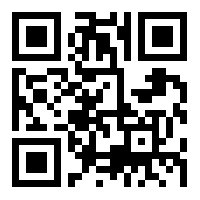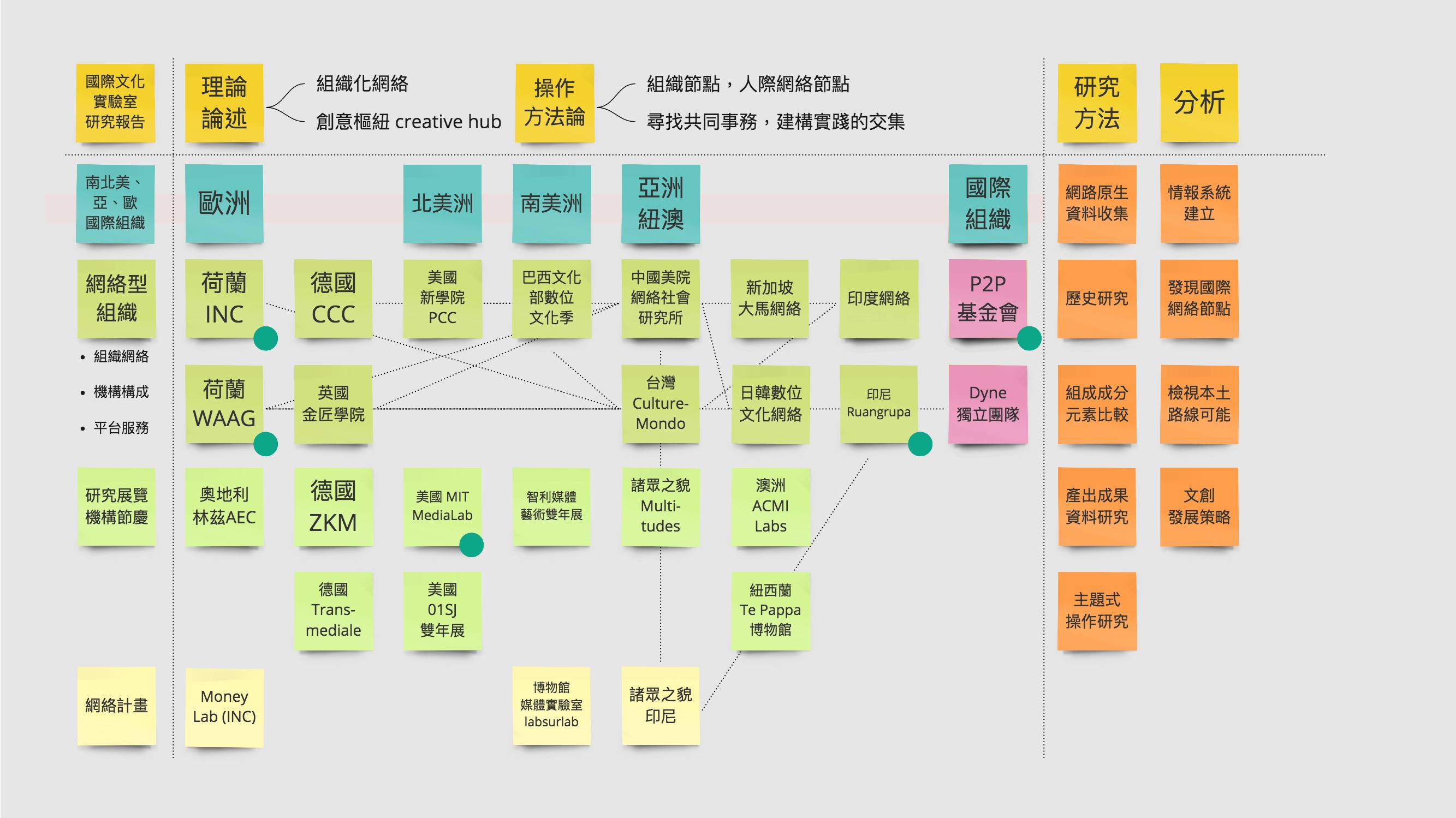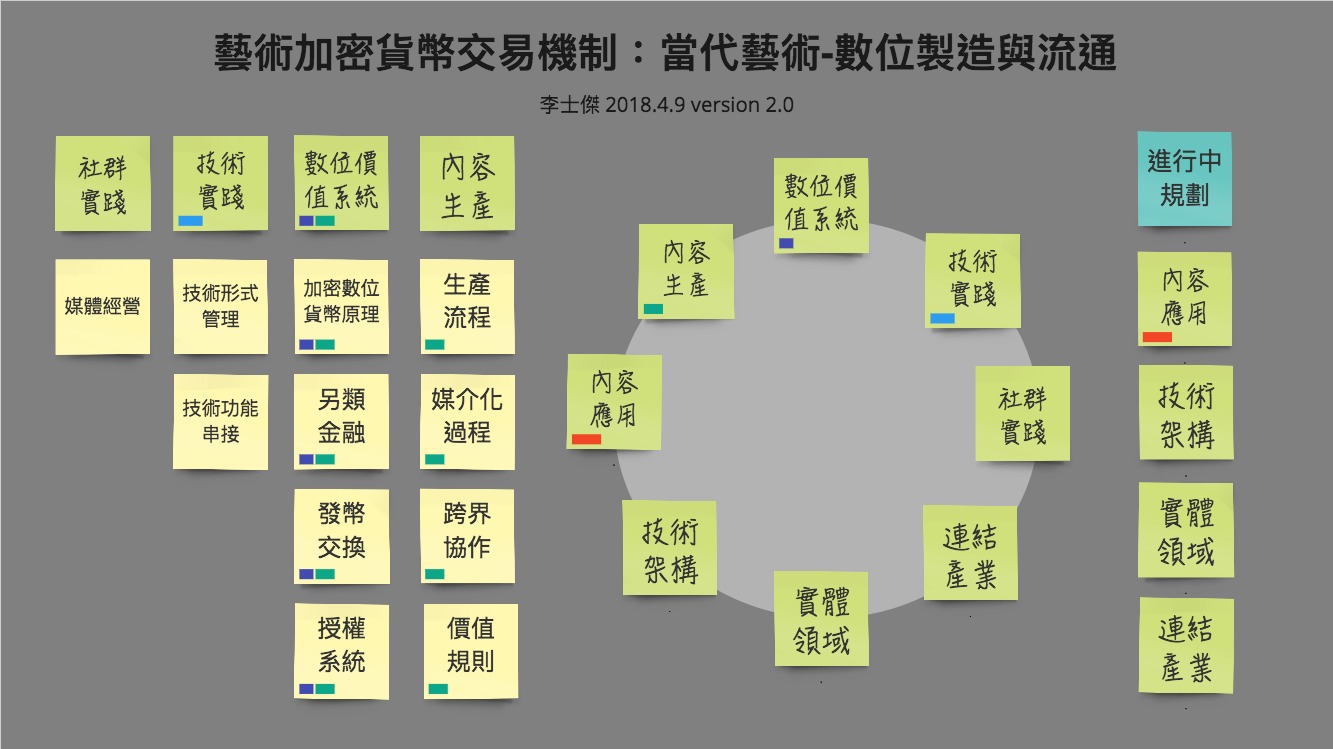# 荷蘭數位計畫/組織/國際發展現況分析
李士傑,宏華環境保護與數位未來基金會 / 星輿股份有限公司
## 投影片連結
- HackMD.io 的共筆
- 短網址連結: s.ilyagram.org/global
- QR Code:

### 講者簡介
- 李士傑簡介 http://work.ilyagram.org/docs/self
- 社會科學研究者的訓練
- 宏華環境保護與數位未來基金會 https://www.honghuafund.org/
- 資料與資訊技術介入,作為中介的社會關懷
## 摘要
區塊鏈發展的他山之石,何以作為在地的磨刀石,來打磨手上的美玉?我們將從荷蘭的數位文化發展案例歷史切入,來試圖理解文化藝術生態系統,在什麼樣的問題意識下,如何跟區塊鏈加密技術的種種應用與發展對話。
## 文化解碼:初步研究成果
區塊鏈如何是一個數位文化的新興、重要研究課題?新興的文化場域當中,有著什麼樣的行動者(actor),而我們又可以用什麼樣的方法來研究與分析?應該創造什麼樣的社群、實體與虛擬的空間,沿著什麼樣的邏輯來演進與對話?
### 過往數位典藏計畫的實務實踐
- 數位典藏「Web 2.0 計畫」的社交媒體系統的探索
- 平台的效能、使用者回饋資訊與調教經驗
- 數位化與文化內容的交易成本分析
### 全球文化實驗室比較研究
- 文化部藝發司數位人文網路平台案
- 中國美院網絡社會研究所黃孫權教授領導

### 數位文化創意平台
- 生活美學基金會,社會創新與數位人文方向:計畫共同主持人

- 鄭淑麗,陳界仁
---
## 國際數位文化區塊鏈案例分析
- 探討具體個案,理解區塊鏈如何進場?如何被對話?
- 目的:回答文化藝術領域,為何需要思考區塊鏈問題?
- 分析行動者(actor)
- 反省虛實的連結網絡、社群組織與空間,及其運作邏輯
### 荷蘭網路文化中心(INC)與 MoneyLab 經驗
- 荷蘭應用科學大學網路文化中心 INC

- Geert Lovink,總監/執行長
- [Geert Lovink 論述文集](http://networkcultures.org/geert/)
- 《社交媒體的深淵》(The Social Media Abyss)
## 網路文化中心所推動的計畫(projects)

### 金錢實驗室計畫
- MoneyLab 系列實驗室
- [MoneyLab 1](http://networkcultures.org/moneylab/resources/past-events/moneylab-1-report/) Amsterdam, 2014
- [MoneyLab 2](http://networkcultures.org/moneylab/resources/moneylab2-report-and-videos/) Amsterdam, 2015
- [MoneyLab 3](http://networkcultures.org/blog/2016/12/22/moneylab-3-documentation-now-available/) Amsterdam, 2016
- [MoneyLab 4](http://networkcultures.org/moneylab/events/moneylab-4/) London, 2017
- [MoneyLab 5](http://networkcultures.org/moneylab/2018/05/01/moneylab5-matters-of-currency-slime-mold-token-fetish-and-wombcoins/) Buffalo, NY, 2018
### 角色扮演
在區塊鏈與加密貨幣爆炸性的發展過程中,彷彿缺乏了一些人性的與練習體驗的部分...
<iframe src="https://player.vimeo.com/video/204861694" width="640" height="360" frameborder="0" webkitallowfullscreen mozallowfullscreen allowfullscreen></iframe>
<p><a href="https://vimeo.com/204861694">MoneyLab #3: Role Play Your Way to Budgetary Blockchain Bliss</a> from <a href="https://vimeo.com/networkcultures">Institute of Network Cultures</a> on <a href="https://vimeo.com">Vimeo</a>.</p>
> It has been said that in terms of its ecology of tools and infrastructures, the Blockchain is at the same stage of development as the World Wide Web in the late 1980s. Since 2013 blockchains have become a focus for investment by world banks, fintechs and corporations who predict a fourth industrial revolution of super-automation and hyperconnectivity that will increase global inequity. In this version of the future, code replaces legislation. Decentralised Autonomous Organisations (DAOs) route around systems of regulation and taxation via immutable smart contracts. Those that grew up with the WWW know that decentralised infrastructure does not equate to decentralised power. Therefore it is crucial that people from diverse disciplines and backgrounds are involved when working out how blockchain technologies can be shaped in the interests of more diverse needs and interests.
>
> Role play the formation of a DAO for solidarity and a commons for the arts in the age of networks. Experience and debate the hopes and tensions; work through the asymmetries, dramas, inequities and politics of coalitions across difference…. starting with the budget! This activity is a precursor to a series of smart contract role play and design activities for people of all backgrounds and disciplines – lawyers, philosophers, economists, financiers, artists, designers, developers – where participants will write social relations into code as a basis for debate.
>
### 區塊鏈治理議題
這裏的治理議題,不只是國家的金融治理問題,更包括了技術本身內含的治理性,以及自身欲望 / 願望與社會集體的改變的管理議題...

[Governance in the Age of Blockchains and Digital Currencies](http://networkcultures.org/moneylab/2016/12/06/governance-in-the-age-of-blockchains-and-digital-currencies/)
- 投資基金與預測加密貨幣未來發展:Justin Bons,Cyber Capital 創辦人
> "...this possibility to fork proves the autonomy of cryptocurrencies: to not have to live under majority rule."
- 運用區塊鏈來治理(內部事務):Emanuele Braga,米蘭 Macao Center for Art and Research
> "....revalue different tasks in the art center and to create a shared basic income between members."
> "....The implementation of cryptocurrency allows for a questioning of relationships in production and self-governance. ..... their choice for using cryptocurrency. The idea was to produce a local autonomy within a larger structure. The use of cryptocurrency allows the organization to be in dialogue with international movements, while fine-tuning their system for local use."
- 探索經濟的可能性 --- 例如難民營中的數位時間銀行:Roberto Valenti from the University of Amsterdam (UvA) presented PROFΞTH
> "...a demand based economy that connects blockchain, Artificial Intelligence (AI) and Internet of things (IoT) technologies."
>
> "vote on specific algorithms....not on politician"
- 區塊鏈作為治理工具,或者自己建立國家:Susanne Tarkowski Tempelhof of Bitnation
> “In what kind of nation do you want to live in 2026? A capitalist, communist, or socialist nation, or do you want to create your own?”
>
- 科技如何創造社會改變?:資訊法社會科學專家 Dr. Balázs Bodó
> "錯置信任認為科技可以帶來自主性"
- 討論
> "...fragmentation also means greater freedom of choice"
>
## MoneyLab 4: 藝術文化與金融行動主義
- [收到《超克騙局》](https://ilyagram.wordpress.com/2018/06/21/%e6%94%b6%e5%88%b0%e3%80%8a%e9%87%91%e9%8c%a2%e5%af%a6%e9%a9%97%e5%ae%a4%e8%ae%80%e6%9c%ac-2%ef%bc%9a%e8%b6%85%e5%85%8b%e9%a8%99%e5%b1%80%e3%80%8b/)
> 內文分成五個部分:
> 第一部分,〈更新數位經濟〉(Updating Digital Economy),
> 第二部分,〈區塊鏈批判〉(Blockchain Criticism),
> 第三部分,〈演示未來金融〉(Performing Future Finance),
> 第四部分,〈大計畫批判〉(Critiques of the Grand Schemes),
> 第五部分,〈金融想像的另類可能〉(Alternatives in Financial Imagination)。
>
>
> 「大計畫批判:著名金融作家與記者 Brett Scott 談數位付費全景監獄時代的金錢;印度學者 Tripta Chandola 以民族誌的方式,談論非正式經濟下的去價值化「信任」(devaluing ‘Trust’)做為一種貨幣;研究不穩定創業新階級(「諸羅流眾」) Silvio Lorusso 對個人群眾募資與(文創)創意企業家主義的看法(「第一次是藝術,第二次是悲劇」);法籍學者 Nathalie Maréchal 談對貧窮的戰爭,如何因為資料而變成對窮人的戰爭。
- 當物聯網連上了你的錢包:[O’Dwyer:「會交易的東西」](https://ilyagram.wordpress.com/2018/06/26/ittransacts/)
> 「....可以自主作出決策的事物,就將成為世界中的一個角色(actor)。」
>
> 「物聯網冰箱沒有牛奶了,自動連去超市選購牛奶,然後叫快遞送貨到家。冰箱要怎麼付錢?冰箱能否跟超市定長期契約?超市能否針對連線的冰箱,提供折扣?超市能否藉由降價,來交換牛奶隔壁物件的情報?最終,冰箱能否背叛擁有者,成為獨立的存在?」
## MoneyLab 5:貨幣系統那些事兒
- 子宮幣(WombCoin)
> "WombCoin is said to work against the reproduction of market dynamics in friendships, relationships, social behaviour, and in our bodies."
- 代幣化
- Brett Scott’s talk about Token Fetishation through the lens of two theories of money, money as commodity and an IOU
- 美國另類貨幣系統的歷史
- Max Haiven presented a Benjaminian narrative on the history of money in which he digged down to hobo nickels, wampums, and alternative coin systems that have circulated in US history.
- 勞動,薪酬-時間與反薪酬
- Leigh Claire La Berge introduced the concepts of wage-time and counterwage as a way to critically reflect on how money and labour is valued and represented. La Berge took the audience on a visual history tour, from the Ford years and via the Whip Inflation movement, to critically reflect on the mediation of financialization and it’s echoes in today’s economy.
- 其他的議題
- Yvette Granata gave a talk in which she managed to connect finance-power, data-politics and slime mold to forms of power transference.
- Fran Illich and Gabriela Ceja presented their Zapatista Coffee project and showed their film Labor of Love..
- And Paul Kolling of Terra0 pondered if a forest can work with an AI to maintain itself outside of human design.
- Stephanie Rothenberg made the argument that finance art is able to ask the uncomfortable questions, entering a game space where rules can be broken and risks can be taken with possibly different consequences.
- Katja Praznik argued that art is often thought of as unalienated labor, and as a free gift to society, as if the artist is answering an essentialist calling. This genders the paradox of labor in art in a similar way as domestic labor is thought of by many as the call of women.
## 網路文化中心研討會:飛錢(Flying Money)
- 研討會官方網址:https://www.flyingmoneyconference.eu/
- 會議時間與地點:2018.5.22-23 荷蘭阿姆斯特丹
- 主辦單位:阿姆斯特丹市政府


- 策劃者言:[〈飛錢:組織化的犯罪與新數位金錢〉](https://ilyagram.wordpress.com/2018/06/16/flyingmoney/)
- 從實驗室到研討會:文化實驗室與城市、歐盟的合作
- 研討會的形式:如何能夠激發創意
- 跨領域的對話
- 論述主導的策展
- 議題內容
- 金錢的未來(2008 年金融風暴與另類經濟的出路,Sassen 對金融的反思)
- 誰掌控城市?
- 加密在城市的意義(黑客的價值)
- 城市裡的平行金融流動
- 調查城市裡的金融隱微諸流
- 藝術家 Femke Herregraven
<iframe width="560" height="315" src="https://www.youtube.com/embed/CQR_Qp04yrg" frameborder="0" allow="autoplay; encrypted-media" allowfullscreen></iframe>
- 規範城市金融
- 金融情報與治理的未來
- 年輕人與金融黑客工作坊
- [沒有經濟學家的經濟嘉年華](http://www.metropolism.com/en/features/31473_economia)

- 無現金化彷彿高大上
>「...當越來越多的人們仰賴電子環境,而非金錢的日復一日基礎與看得見摸得到的形式,同時世界的金融系統越來越複雜,許多人被迫要去困惑思考:誰該對這種新型態的金錢價值、這些交換系統的穩定性負責?從這個角度出發,理解組織化犯罪擁有什麼樣的機會就顯得分外重要。現金(交易)往往被視為一種髒兮兮的商業活動,一種讓罪犯得以洗錢的方式,同時數位的金錢可以看起來像是一種對這些問題的一種具有吸引力的解答。加密貨幣連結到「拉高與出倉」式騙局(pump & dump schemes)、猖獗的內線交易,它也被運用在勒索贖金與「暗網」(dark web)平台(如數位絲路市集),顯示了這種思考方式的弱點。」
## 結論:區塊鏈與實踐的可能性
在災難現場的經驗,你會希望有一種工具直接把人們的苦難,用最小的摩擦力與代價,來盡可能縫補那些悲傷與苦痛。
- [The Collective Turn in Finance: On Commonfare and Social Wallet by Letizia Chiappini](http://networkcultures.org/moneylab/2018/07/10/social-wallet/)
- [Social Wallet 社會錢包](https://starts-prize.aec.at/en/social-wallet/)與 [freecoin 自由貨幣](https://freecoin.dyne.org/)
> The experimental phase of Social Wallet started in 2013 with a European Union project called D-CENT[8]. This project itself was a collaborative policy-making tool. The initiative aimed to improve participatory design and digital tools for citizens, such as decentralized tools to engage individuals in public participation. The project aimed to build privacy-aware tools for direct democracy and economic empowerment. One of these tools was a digital wallet; which was initially called freecoin. The reason to develop this tool was to use it as an incentive for people to participate in policy-making processes. At that time there was a large monolithic application, namely a software project that included a system for authentication and authorization. Afterwards it was broken down in multiple modules.
>
> At the time of writing in June 2018, Social Wallet is in a pilot stage. The core of the tool is entirely functional, the software developers keep improving and adding features in an agile way, as Aspasia Beneti, lead developer of the tool at Dyne.org, explained to me in an interview: